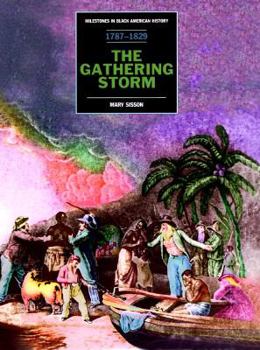The Gathering Storm (Pbk)(Oop)
(Part of the Milestones in Black American History Series)
No Synopsis Available.
Format:Library Binding
Language:English
ISBN:0791026787
ISBN13:9780791026786
Release Date:January 1996
Publisher:Chelsea House Publications
Length:117 Pages
Weight:0.69 lbs.
Dimensions:0.3" x 7.0" x 9.3"
Age Range:13 years and up
Grade Range:Grade 8 and higher
Customer Reviews
1 rating
A superb look at this period in Black American History
Published by Thriftbooks.com User , 22 years ago
What makes "The Gathering Storm 1787-1829" so compelling is that it is about the period in American history where slavery was not in the forefront of American politics. I was thinking about what I thought I knew about this period, and it was basically that after the Federal Constitution institutionalized slavery several generations went by before the Missouri Compromise and the Nat Turner rebellion made slavery the national issue. Of course, this was a naive reduction of American history on my part, which is corrected by Mary Sisson's informative fifth volume in the Milestones in Black American History series. "The Gathering Storm" covers the period from the framing of the Constitution in 1787 to David Walker's "Appeal" of 1829, which urged slaves to revolt and kill their masters. This division allows the next volume in the series to cover the period from the Nat Turner revolt to the Fugitive Slave Law."The Gathering Storm" provides unforgettable details about what slavery was like during these four decades when the number of slaves in the United States tripled. Sisson fills this volume with fascinating details about this period: in 1790 New Jersey and Pennsylvania each had more slaves than Tennessee, while in 1829 Cincinnati, Ohio began enforcing an 1804 statue requiring free blacks to post a $500 bond before settling in the city. There are other examples of laws clearly intended to preserve the institution of slavery, such as those forbidding Quakers from buying slaves that they obviously intended to free. But Sisson is also able to put these facts into context by focusing on two significant developments that had immense ramifications. First, the invention of the cotton gin by Eli Whitney spurred the growth of slave-worked plantations that expanded slavery further west in the South. Second, the successful slave result that resulted in the formation of the independent nation of Haiti. Because of the fear of a slave uprising in the United States, abolitionists were able to get a federal ban on the importation of slaves, which had huge consequences for how slaves were treated and valued in the South. Sisson also presents a series of compelling historical figures, such as Richard Allen, founder of the Free African Society and of the first independent black church in America; merchant-seaman Paul Cuffe and editor John Russwurm, two of the chief proponents of the colonization movement which sought to resettle free American blacks in West Africa; mathematician Benjamin Banneker who surveyed the land for the District of Columbia and produced a series of almanacs; Gabriel Prosser and Denmark Vesey, who planned slave uprisings that unsettled the South; Vincent Oge and Francois-Dominique Toussaint-Louverture, leaders of the slave revolt that created Haiti; and David Walker, the firebrand who advocated violent revolt or predicated the nation would face a bloody civil war. When the volume ends with the Missouri Compromise and Walker's inflammat





